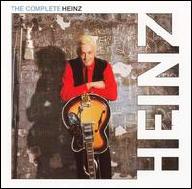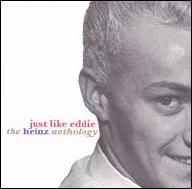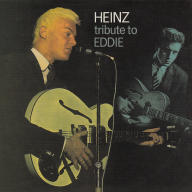He was born Heinz G. Burt in Detmold, Germany in 1942, and came to England at age seven, when his family resettled in Eastleigh, Hampshire, between Southampton and Winchester. By the second half of the '50s, when he wasn't working as a butcher's assistant at a grocery store, he had joined the ranks of England's teenaged rock & roll fans. He was also serious enough in his interest in music to take up the bass, of all instruments. In 1961, he was playing with a local band called the Falcons, who were good enough to get an audition with producer Joe Meek, who didn't think much of the band but was attracted personally to the bassist's blonde, Teutonic good looks -- so involved was he in Heinz Burt's physical appeal, that he eventually persuaded the musician to dye his hair bleach-blonde, to make him stand out even more in any band he worked with. According to David Wells in his notes for the Heinz compilation Just Like Eddie, Meek tried to push Heinz into the bassist's spot in his resident house band the Outlaws, but resistance from that group's leader, Chas Hodges, killed that idea. Instead, Meek assembled a whole new group called the Tornados, which included Alan Caddy (guitar), Clem Cattini (drums), and Roger LaVern (organ), plus Heinz on bass. They initially played as a backing band to Billy Fury whilst Meek tried to work out an adequate recording debut for the group. The Tornados scored a huge international hit on record their second time out with Telstar. And it was soon after their second hit, Globetrotter, in 1963, that Meek began recording Heinz for releases of his own, billed simply as "Heinz."
This was an instance where Meek's romantic fixation outstripped his musical judgment, at least at first. Heinz's singing (assuming it was his singing -- it's pretty much accepted that he had some help, if not an outright substitute on the A-side) was overpowered by the typically ornate Joe Meek production sound on his debut single, Dreams Do Come True b/w Been Invited to a Party -- despite being a great showcase for the Meek sound, which had propelled Telstar to the top of the charts a few months earlier, that single, issued on the British Decca label, was a critical and commercial flop. But for Heinz's second single, Meek gave him a demo by Geoff Goddard of a tribute song to deceased American rock & roller Eddie Cochran -- the American-born Cochran had been a huge star in England, and had died in a car crash in 1960, while on his way to the airport for a return to the United States, so his death had a special resonance for British listeners. The composition itself was similar to Goddard's earlier Tribute to Buddy Holly, which had been been a hit for Mike Berry in 1960, but with one important difference -- whereas the earlier song had taken a relentlessly serious tone about its departed subject, sufficient for the BBC to ban the record for its supposed "morbidity" (which hurt its sales), Just Like Eddie was upbeat, even joyous in its tone, celebrating the man's music rather than dwelling on his death. The hook-laden song -- featuring superb playing by the Outlaws (including a young Ritchie Blackmore on guitar) -- didn't offend the BBC censors, and with a confident, even bold lead vocal from Heinz, it soared into the British Top Five in the summer of 1963, in addition to charting high in several other European countries; it was so successful, that Heinz had to add a full-scale Cochran tribute, in the form of a brace of the late rock star's songs, to his own stage set. He also got much better as a performer, backed by a trio called the Saints, and audiences suddenly started appreciating his shows in a way that they hadn't originally. A pair of successful EP releases followed, Heinz and Live It Up (the latter hooked around a movie of the same name, in which he appeared), along with a less successful single (Country Boy) and a well-received tour alongside Billy J. Kramer the Dakotas and Bobby Rydell. As a creation of Meek's production techniques and grooming preferences, Heinz was something of a throwback to late-'50s and early-'60s British teen idol pop, but the single's success, and his growing confidence -- which translated into stronger singing -- and the tour that followed, proved that he could compete for audience attention, even amid the Merseybeat boom spearheaded by the Beatles et al. In March of 1964, Heinz achieved another milestone with the release of his first LP, Tribute to Eddie, comprised almost entirely of songs associated with Cochran.
But despite his improved singing and acceptance as a concert act, Heinz's record of success beyond this point was more sporadic. Meek was unable to write or find songs that were right for him, and despite the organizing of a new band -- Heinz the Wild Boys, which included Blackmore and future Episode Six drummer Mick Underwood, who contributed some great playing to his records -- he never saw another hit of the proportions of Just Like Eddie. He even tried covering Bob Dylan's Don't Think Twice, It's Alright at a time when Dylan was all the rage and there were precious few pop/rock covers of his work, to little avail. And a switch in labels in 1964, from Decca to EMI, didn't stimulate any huge upsurge in sales. He saw modest success with records such as Diggin' My Potatoes, but it was clear by early 1965 that his star was fading rapidly. Adding to his troubles was his split with Meek, over personal and professional differences. The producer/manager had lavished attention on Heinz, in hopes of a romantic attraction developing, but the bassist/singer -- although he did share Meek's apartment for a time -- was not oriented that way. Meek was willing to hold out hope until Heinz introduced him to his girlfriend, and that soured Meek's interest in his protégé. The end of any personal side to Meek's interest in his career was complicated further over his reportedly less-than-forthright payment of royalties, which led to an angry confrontation between the two, long after the personal split, at the end of 1966. Ironically, it was one of Heinz's personal possessions, left behind when he parted company with Meek, that would become the means of the latter's death. On February 3, 1967 -- the anniversary of Buddy Holly's death -- the producer, long troubled in his personal and professional life, took the shotgun that Heinz had left behind and killed his landlady and then himself with the weapon. Following a police investigation that cleared him, Heinz did carry on in music, even appearing at a rock & roll revival event in England that also included Chuck Berry. But by the '70s, he was making a living outside of music. He did perform at some rock & roll shows, including a '90s tribute concert to Joe Meek, and there were periodic re-releases of his work in England, both in the LP and CD eras. Heinz had achieved respect by then as an elder statesman of early-'60's British pop/rock, even if he'd seen precious little in the way of financial reward from his career. But by then he was living on borrowed time, fighting motor neuron disease that had left him wheelchair-bound in his fifties. He died of a stroke in 2000. Six years later, amid the burgeoning interest in the musical output of Joe Meek and his stable of artists, Castle Records released the double CD Just Like Eddie: The Heinz Anthology. ~ Bruce Eder & Richie Unterberger, Rovi















